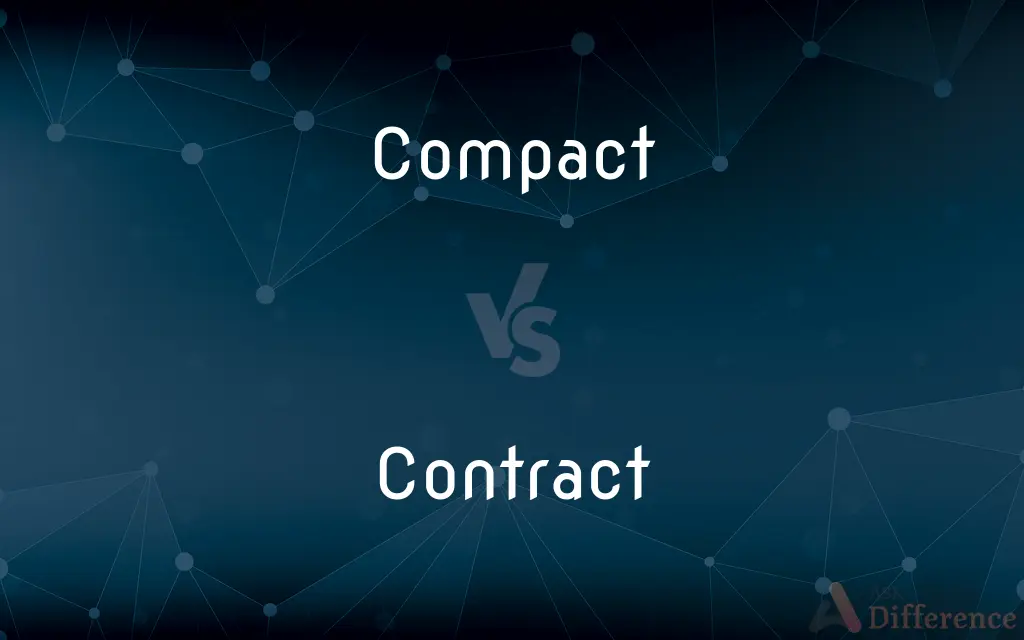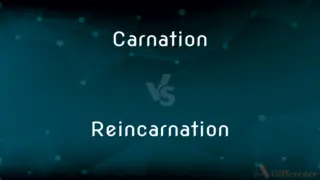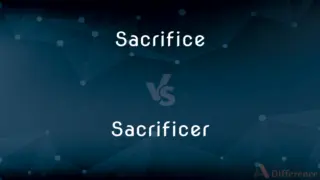Compact vs. Contract — What's the Difference?
Edited by Tayyaba Rehman — By Urooj Arif — Updated on March 6, 2024
A compact is an agreement or covenant between parties, while a contract is a legally binding agreement enforceable by law.

Difference Between Compact and Contract
Table of Contents
ADVERTISEMENT
Key Differences
A compact often refers to an informal agreement, covenant, or mutual understanding between parties, which may or may not have legal enforceability. In contrast, a contract is a formal agreement between parties that creates mutual legal obligations, enforceable by law. The nature of a compact allows for flexibility and is often used in political or social contexts, whereas contracts are foundational in commercial and legal transactions, requiring specific elements like offer, acceptance, and consideration for validity.
While compacts can be based on honor, tradition, or mutual interests, creating a sense of duty among the parties involved, contracts are based on legal statutes and principles, providing a framework for enforcement and dispute resolution. Compacts emphasize the importance of the agreement's spirit and the relationship between the parties, whereas contracts focus on the precise terms, conditions, and the legal remedies available in case of breach.
The use of compacts is common in international relations, such as agreements between states or countries, where formal legal enforcement may be difficult or unnecessary. On the other hand, contracts are ubiquitous in the business world, where clear, enforceable agreements are essential for transactions, services, and employment relationships.
Compacts may not require the same level of formality as contracts, sometimes being made verbally or based on shared understandings. Conversely, contracts typically require a higher degree of formality, often needing to be in writing and signed by the parties involved, especially for transactions exceeding certain monetary thresholds or involving complex terms.
Despite these differences, both compacts and contracts are important tools for establishing agreements and expectations between parties. They serve different needs and contexts, with compacts allowing for more flexibility and contracts providing legal security and enforceability.
ADVERTISEMENT
Comparison Chart
Nature
Informal agreement or covenant.
Formal, legally binding agreement.
Legal Enforceability
May not be legally enforceable.
Legally enforceable by law.
Usage Context
Political, social, and international relations.
Commercial, legal, and employment transactions.
Basis
Honor, tradition, mutual interests.
Legal statutes, offer, acceptance, consideration.
Formality
Can be verbal or based on mutual understanding.
Requires higher level of formality, often in writing and signed.
Compare with Definitions
Compact
Focuses on the spirit of agreement.
A compact in a family to uphold certain values.
Contract
Provides a framework for enforcement.
The business could seek legal recourse under the terms of the contract.
Compact
An agreement or covenant between parties.
The Mayflower Compact was a foundational document for governance among the Pilgrims.
Contract
A legally binding agreement between parties.
She signed a contract for her new job.
Compact
May not have legal enforceability.
A compact between friends to support each other's goals.
Contract
Requires offer, acceptance, consideration.
The contract for sale was finalized after negotiation.
Compact
Can be based on mutual understanding.
A compact among community members to maintain local traditions.
Contract
Enforceable by law, with specific terms.
The contract included clauses for breach of agreement.
Compact
Often used in political or social contexts.
An international compact was reached to address climate change.
Contract
Used in commercial and legal transactions.
A contract was drafted for the sale of the house.
Compact
Closely and firmly united or packed together; dense
Compact clusters of flowers.
Contract
A contract is a legally binding document between at least two parties that defines and governs the rights and duties of the parties to an agreement. A contract is legally enforceable because it meets the requirements and approval of the law.
Compact
To consolidate; combine.
Contract
An agreement between two or more parties, especially one that is written and enforceable by law.
Compact
(obsolete) Joined or held together; leagued; confederated.
Contract
The writing or document containing such an agreement.
Compact
Closely crowded together;
A compact shopping center
A dense population
Thick crowds
Contract
(legal) An agreement which the law will enforce in some way. A legally binding contract must contain at least one promise, i.e., a commitment or offer, by an offeror to and accepted by an offeree to do something in the future. A contract is thus executory rather than executed.
Contract
(legal) The document containing such an agreement.
Contract
(legal) A part of legal studies dealing with laws and jurisdiction related to contracts.
Contract
To make an agreement; to covenant; to agree; to bargain; as, to contract for carrying the mail.
Contract
Enter into a contractual arrangement
Contract
Engage by written agreement;
They signed two new pitchers for the next season
Common Curiosities
What are the necessary elements for a contract?
A contract requires offer, acceptance, and consideration to be legally valid.
Are verbal agreements considered contracts or compacts?
Verbal agreements can be considered contracts if they meet the legal criteria, but they are often seen as less formal and might resemble compacts.
What happens if a contract is breached?
Breach of contract allows the injured party to seek legal remedies, such as damages or specific performance.
What distinguishes a compact from a contract?
A compact is often an informal agreement without legal enforceability, while a contract is a formal, legally binding agreement.
How is a breach of compact addressed?
Breaches of compacts may be resolved through negotiation or reliance on the parties' honor, as legal recourse is limited.
Can a compact be legally enforced?
While some compacts can have legal significance, they are generally not as enforceable as contracts.
Why are compacts important in international relations?
Compacts allow countries to collaborate on common goals and issues where formal legal agreements are not feasible or necessary.
Can a compact become a contract?
A compact could evolve into a contract if it is formalized and includes the necessary elements for legal enforceability.
Do all contracts need to be in writing?
While not all contracts need to be in writing, certain types (e.g., real estate transactions) are required by law to be documented.
What role does consideration play in a contract?
Consideration refers to something of value exchanged between parties, a crucial element for a contract's validity.
Can individuals create compacts?
Yes, individuals can create compacts for personal agreements or understandings that do not require legal enforcement.
Why might parties choose a compact over a contract?
Parties might choose a compact for its flexibility, simplicity, and the emphasis on mutual trust and understanding.
How do compacts and contracts differ in formality?
Compacts can be less formal and may not require documentation, while contracts typically require a higher degree of formality.
Can businesses use compacts?
Businesses might use compacts for informal agreements or understandings, but they rely on contracts for legal security.
What makes contracts essential in the business world?
Contracts provide a clear, enforceable framework for transactions, protecting the interests of all parties involved.
Share Your Discovery

Previous Comparison
Carnation vs. Reincarnation
Next Comparison
Sacrifice vs. SacrificerAuthor Spotlight
Written by
Urooj ArifUrooj is a skilled content writer at Ask Difference, known for her exceptional ability to simplify complex topics into engaging and informative content. With a passion for research and a flair for clear, concise writing, she consistently delivers articles that resonate with our diverse audience.
Edited by
Tayyaba RehmanTayyaba Rehman is a distinguished writer, currently serving as a primary contributor to askdifference.com. As a researcher in semantics and etymology, Tayyaba's passion for the complexity of languages and their distinctions has found a perfect home on the platform. Tayyaba delves into the intricacies of language, distinguishing between commonly confused words and phrases, thereby providing clarity for readers worldwide.















































